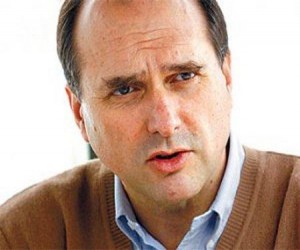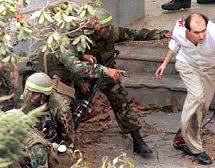Francisco Tudela van Breugel Douglas
 The
first of three children, Tudela was born in Lima into an upper-class
family. His father, Felipe Tudela y Barreda, served as ambassador
and his grandfather was a Prime Minister. His mother was jonkvrouw
Vera van Breugel-Douglas, daughter of the baron
Casper van Breugel-Douglas
(member of the Dutch nobility), first Netherlands Ambassador
accredited to the Soviet Union. The
first of three children, Tudela was born in Lima into an upper-class
family. His father, Felipe Tudela y Barreda, served as ambassador
and his grandfather was a Prime Minister. His mother was jonkvrouw
Vera van Breugel-Douglas, daughter of the baron
Casper van Breugel-Douglas
(member of the Dutch nobility), first Netherlands Ambassador
accredited to the Soviet Union.
Francisco Antonio Gregorio Tudela van Breugel-Douglas (Lima, July 20, 1955) is an expert in
International Law and International Relations. Has been a member of
the Democratic Constituent Congress of 1993, Minister of Foreign
Affairs (1995 -1997), Ambassador of Peru to the UN (1999-2000), Vice
President of Peru and President of the Commission of Foreign Affairs
of Peru's Congress (2000 - 2001).
He attended school in San
Isidro Marist College, culminating in 1971. After a year at the
Pontifical Theological Faculty of Civil and Lima, admitted in 1973
to the Pontifical Catholic University of Peru, where he would
graduate as a lawyer and would become Professor of International Law
and State Theory Contemporary International Relations.
In
1980 he was Secretary of the Department of Elections Jury of Lima in
the first general elections after 12 years of military dictatorship.
In 1983 he was deputy director of the Daily Mail Lima, where he had
a daily column. In 1984 he started his collaborations in Listen
Magazine and the Daily Express. In 1984, after working briefly
Institute for Liberty and Democracy Hernando de Soto, he moved to
the University of Navarra, in Spain, where he was assistant
professor of political law courses I (Theory of State) and Political
Law II (Law Constitutional). In 1988 he moved to the London School
of Economics and Political Science, London, UK, where he obtained an
LLM in International Law and Regulation of Financial Markets.
In 1990 he returned to Peru and was Professor of International
Economic Law, State Theory and Contemporary International Relations
Master in International Law from the Pontifical Catholic University
of Peru. A founding member of the Institute of International Studies
(IDEI) of the university. Having this university signed an agreement
with the Naval War College, Francisco Tudela was featured ESGN to
dictate the course of History of International Relations and
Strategic Thinking. He also taught History of strategic thinking in
the War College of the Peruvian Army and was speaker of the Center
for Advanced Military Studies (CMEA).
International
commentator since 1991, Francisco Tudela took over the international
segment of the Sunday magazine of America TV, Channel 4 since late
1992. Elected by the Parliamentary list Renovation Party, he served
as Vice President of the Commission of Foreign Affairs of the
Democratic Constituent Congress. Drafted the current preamble in the
"1993 Constitution". In August 1993, presented a paper at the
International Symposium on "Democracy and Human Rights in Peru 90",
organized by the Pontifical Catholic University of Peru, Georgetown
University and the University of Maryland, entitled "The Origins of
coup of April 5, 1992 ", which blamed the Revolutionary Government
of the Armed Forces (1968-1980) for the debacle social, economic and
political life of the 80s, noting that the dissolution of Congress
April 5 1992 President Fujimori was a Bonapartist coup as epilogue
of a process of dissolution of the state.
At the outbreak of
the Cenepa conflict with Ecuador, Francisco Tudela was sent as
Ambassador at the United States and Canada to explain the Peruvian
position. He had interviews with Secretary of State Warren
Christopher, Henry Kissinger and with the Minister of Foreign
Affairs of Canada. Alberto Fujimori to be elected President in 1995,
appointed on 28 July 1995, to Francisco Tudela as Minister of State
for Foreign Affairs, a position he served continuously until July
17, 1997. As Foreign Minister, formalized definitely MOMEP
Demilitarized Zone on the stage of conflict with Ecuador, exchanged
notes with the Republic of Chile returning and canceling calls "Lima
Convention", containing one of these notes a comprehensive proposal
for delivering outstanding facilities Lima Treaty of 1929, in the
port of Arica.
As Foreign Minister, personally led peace
negotiations with Ecuador, achieving definitely agree with Ecuador
in Quito on February 23, 1996, the position of the neighboring
country regarding their limits with Peru, by sharing of notes
containing the "remaining impasses" between the two countries.
Likewise, the parties failed to agree, in Buenos Aires on June 19,
1996, the role of the guarantor countries of the Rio de Janeiro
Protocol, which would be governed exclusively within the terms of
the treaty. On October 29, 1996, in Santiago, Chile, Ecuador and
agreed with the guarantor countries that talks to the demarcation of
the Peruvian-Ecuadorian border would comply with the terms of the
Protocol of Rio de Janeiro in 1942, in recognition of the first full
time since 1952 boundary treaty validity of Peru-Ecuador.
 |
| Escaping from the Japanese residence, Lima |
The December 17, 1996 was taken hostage by the terrorist group Tupac
Amaru Revolutionary Movement, together with 71 other people, in the
Japanese ambassador's residence in Lima. On the morning of December
18, Nestor Cerpa Cartolini, leader of the terrorist group, announced
the execution of Tudela, the highest-ranking hostage policy to 12:00
noon. The execution was not carried out, Tudela remaining 126 days
as a hostage. During Operation Chavin de Huantar, on April 22, 1997,
Tudela escaped his captors - that sought to kill him - until the
roof of the residence, where he received a bullet wound in the leg
and 60 shrapnel in body. The Peruvian Army Commander Juan Valer
Sandoval died on duty covering the escape of Tudela.
In May
1997, he was president of the Regular Session of the XXVII General
Assembly of the OAS. He resigned from the Ministry of Foreign
Affairs on July 17, 1997. That same year he was appointed Director
of the Institute of International Studies at the Pontifical Catholic
University of Peru. On September 4, 1997 at the National University
of Piura conferred the Honorary Doctorate in International Law for
the important services rendered to the country. In November 1997 he
moved to Harvard University in Cambridge, Massachusetts, USA, where
he was a Visiting Scholar at the David Rockefeller Center for Latin
American Studies. The following year he was appointed Fellow of the
Weatherhead Center for International Affairs at the university. He
was also a lecturer at the United States War College, Carlisle
Barracks, Pennsylvania, USA. In 1999 he was appointed Ambassador
Plenipotentiary of Peru to the United Nations, serving in that
behalf and as president of the Latin American (GRULA) at the UN
until 2000.
In the general elections of 2000, Francisco
Tudela was elected Congressman and First Vice President of Peru with
the highest vote in history, 840,000 preference votes, by grouping
"Peru 2000" led by Alberto Fujimori. Sworn in as Vice President on
July 28, 2000. Three months later and as a result of corruption
scandals revealed by the "vladivideos" Vladimiro Montesinos,
Francisco Tudela resigned on October 23, 2000 to First Vice
President Fujimori and the bed, holding the presidency of the
Committee on Foreign Relations Congress. Almost a month later and
following the resignation of Fujimori to the presidency from Tokyo
on November 19, 2000, Tudela temporarily assumed the Presidency of
the Congress in the interregnum between the assumption of Valentin
Paniagua to the Presidency of the Republic and the election of
Carlos Ferrero for president of the legislature. At the end of his
term in the Peruvian Congress, Francisco Tudela was appointed in
September 2001, Visiting Scholar in the Department of Political
Science at Georgetown University in Washington DC, USA ".
Between 2003 and 2007, Tudela moved to Santiago de Chile, where he
was a consultant for university reform in the Diego Portales
University, Professor of International Relations at the University
of Development, Director of the Masters in Diplomacy at the
University Finis Terrae, Professor Security and Defence Policy of
the European Union Jean Monnet Chair in the EU at the University of
the Andes and Associate Professor of Public International Law at the
Pontifical Catholic University of Chile. It was also incorporated
into the Chilean Academy of Political and Moral Sciences as an
honorary member, but to date has not given its incorporation speech.
In 2007 he returned to Peru and accompanied by his brother
Juan Felipe Tudela van Breugel Douglas faced
judicially Graciela de Losada, who is preventing them from seeing
his father for 92 years, were contesting the custody of the same. By
resolution of the Constitutional Court of 4 June 2008, the brothers
won Tudela Habeas Corpus which had filed for access to his father.
On February 10, 2009, the 12th of Lima Family Court appointed
curators Tudela siblings from her father through Resolution No. 291,
confirming the same the February 5, 2010, through Resolution No. 214
, of the 2nd Chamber of the Family Court of Lima. Conservatorship of
Tudela brothers became res judicata by the judgment on appeal to the
Supreme Court of Peru from 12 July 2010. On July 30, 2009, in an
interview with Radio Programs of Peru, Francisco Tudela said that if
his father was used politically.
Note: Translated from an original script in Spanish.
Any contributions will be
gratefully accepted
Errors and Omissions
|
|
The Forum
|
|
What's new?
|
|
We are looking for your help to improve the accuracy of The Douglas
Archives.
If you spot errors, or omissions, then
please do let us know
Contributions
Many articles are stubs which would benefit from re-writing.
Can you help?
Copyright
You are not authorized to add this page or any images from this page
to Ancestry.com (or its subsidiaries) or other fee-paying sites
without our express permission and then, if given, only by including
our copyright and a URL link to the web site.
|
|
If you have met a brick wall
with your research, then posting a notice in the Douglas Archives
Forum may be the answer. Or, it may help you find the answer!
You may also be able to help others answer their queries.
Visit the
Douglas Archives Forum.
2 Minute Survey
To provide feedback on the website, please take a couple of
minutes to complete our
survey.
|
|
We try to keep everyone up to date with new entries, via our
What's New section on the
home page.
We also use
the Community
Network to keep researchers abreast of developments in the
Douglas Archives.
Help with costs
Maintaining the three sections of the site has its costs. Any
contribution the defray them is very welcome
Donate
Newsletter
If you would like to receive a very occasional newsletter -
Sign up!
Temporarily withdrawn.
|
|
|
|
|
|
|
|
|


